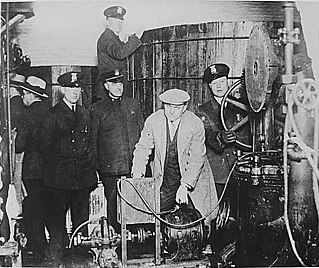
The Eighteenth Amendment of the United States Constitution established the prohibition of "intoxicating liquors" in the United States. The amendment was proposed by Congress on December 18, 1917, and was ratified by the requisite number of states on January 16, 1919. The Eighteenth Amendment was repealed by the Twenty-first Amendment on December 5, 1933.

The Twenty-first Amendment to the United States Constitution repealed the Eighteenth Amendment to the United States Constitution, which had mandated nationwide Prohibition on alcohol. The Twenty-first Amendment was proposed by Congress on February 20, 1933, and was ratified by the requisite number of states on December 5, 1933. It is unique among the 27 amendments of the U.S. Constitution for being the only one to repeal a prior amendment, as well as being the only amendment to have been ratified by state ratifying conventions.

The temperance movement is a social movement against the consumption of alcoholic beverages. Participants in the movement typically criticize alcohol intoxication or promote complete abstinence (teetotalism), with leaders emphasizing alcohol's negative effects on health, personality, and family life. Typically the movement promotes alcohol education as well as demands new laws against the selling of alcohols, or those regulating the availability of alcohol, or those completely prohibiting it. During the 19th and early 20th centuries, the temperance movement became prominent in many countries, particularly English-speaking and Scandinavian ones, and it led to Prohibition in the United States from 1920 to 1933.
A local option is the ability of local political jurisdictions, typically counties or municipalities, to allow decisions on certain controversial issues based on popular vote within their borders. In practice, it usually relates to the issue of alcoholic beverage and marijuana sales.
The Department of Scientific Temperance Instruction, the educational arm of the Women’s Christian Temperance Union (WCTU), was an important part of the temperance movement and played a significant role in generating support for prohibition of alcohol in the U.S.

The World League Against Alcoholism was organized by the Anti-Saloon League, whose goal became establishing prohibition not only in the United States but throughout the entire world.
The repeal of Prohibition in the United States was accomplished with the passage of the Twenty-first Amendment to the United States Constitution on December 5, 1933.

The Methodist Episcopal Church Board of Temperance, Prohibition, and Public Morals was a major organization in the American temperance movement which led to the introduction of prohibition in 1920. It was headed for many years by Clarence True Wilson.
The Crusaders was an organization founded to promote the repeal of prohibition in the United States. The executive board consisted of fifty members, including Alfred Sloan, Jr., Sewell Avery, Cleveland Dodge, and Wallage Alexander. They wanted the government to create stronger laws regarding drunkenness.
The prohibition of alcohol in Canada arose in various stages, from local municipal bans in the late 19th century, to provincial bans in the early 20th century, and national prohibition from 1918 to 1920. The relatively large and powerful beer and alcohol manufacturing sector, and the huge working class that purchased their products, failed to convince any of the governments to reverse their stance on prohibition. Most provinces repealed their bans in the 1920s, though alcohol was illegal in Prince Edward Island from 1901 to 1948. By comparison the temperance act in Ontario ran from 1916 to 1927.
The LaMontages brothers -- Rene, Montaigu, William and Morgan—were high society bootleggers who made $2,000,000 annually through their illegal business during the early years of alcohol Prohibition in the United States.
An Ontario prohibition referendum was held on October 20, 1919, on the repeal of the prohibition of alcoholic beverages. Prohibition had been passed by the provincial government in 1916 under the Ontario Temperance Act, though a clause required a referendum to be held on the issue after three years.
An Ontario prohibition referendum was held on October 23, 1924 on the repeal of the Ontario Temperance Act. The referendum was brought about by a clause in the Act, which permitted the possible repeal of prohibition by a majority vote.
A dry state is a state in the United States in which the manufacture, distribution, importation, and sale of alcoholic beverages are prohibited or tightly restricted. While some states, such as North Dakota, entered the United States as dry states, others went dry after passage of prohibition legislation. Currently, no state in the United States remains completely dry, but some states contain dry counties.

The Temperance movement in the United States is a movement to curb the consumption of alcohol. It had a large influence on American politics and society in the nineteenth and twentieth centuries. Today, there are organizations that continue to promote the cause of temperance.

The Woman's Christian Temperance Union Administration Building is a historic building in Evanston, Illinois, United States. It has served as the publishing house and national headquarters of the Woman's Christian Temperance Union since its construction in 1910. The organization had an important role in the national discussion on prohibition and women's suffrage.

Oklahoma Beer Act of 1933 is a United States public law legalizing the manufacture, possession, and sale of low-point beer in the State of Oklahoma. The Act of Congress cites the federal statute is binding with the cast of legal votes by the State of Oklahoma constituents or legislative action by the Oklahoma Legislature.





